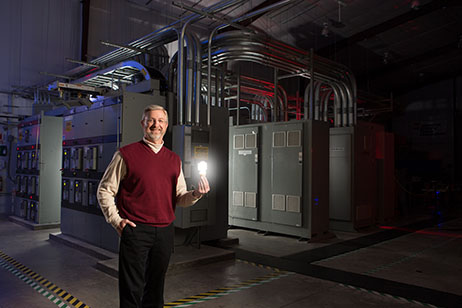University Part of New National Center Focusing on Vehicle Electrical Systems

Distinguished Professor Alan Mantooth is executive director of the National Center for Reliable Electric Power Transmission, a 7,000-square-foot, $5-million power electronic test facility at the University of Arkansas.
FAYETTEVILLE, Ark. – Researchers at the University of Arkansas will help lead a new $18.5 million engineering research center to design and develop vehicle electrical systems that are more powerful, efficient and heat-resistant.
Sponsored by the National Science Foundation, the Power Optimization for Electro-Thermal Systems center, or P.O.E.T.S., will focus on improving current thermal and electrical limits in vehicle designs to make cars more fuel efficient and extend the range of electric cars. Alan Mantooth, Distinguished Professor of electrical engineering at U of A, will serve as deputy director of the research center. Andrew Alleyne, professor of mechanical engineering at the University of Illinois at Urbana-Champaign will serve as director.
“P.O.E.T.S. has assembled a great team of engineers and scientists poised to have a substantial impact on power electronics technology, transportation systems, the workforce and the economy,” said Mantooth, who holds the Twenty-First Century Research Leadership Chair in the College of Engineering.
The center will integrate multiple disciplines and multiple institutions. In addition to the U of A, partners include Howard University, Stanford University, the University of Sao Paolo in Brazil, the Royal Institute of Technology in Sweden, and the University of Illinois at Urbana-Champaign, which will serve as the lead institution.
U of A faculty members joining Mantooth on the center’s research team are: Simon Ang and Juan Balda, professors of electrical engineering and Greg Salamo, Distinguished Professor of physics in the J. William Fulbright College of Arts and Sciences.
Partners from around the world will build new technologies such as three-dimensional thermal circuitry for cooling, next-generation power converters, and algorithms for coordinating the technologies automatically. They’ll look at those technologies from the microchip level all the way up to the entire vehicle.
The U of A will contribute expertise and facilities in several areas, including the development of new electrical and thermal devices, integration of thermal and electrical technologies into high-density power modules, design and analysis methods and tools, and optimization and control methods for simultaneous electrical-thermal design.
“We are extremely excited to have the opportunity to help drive the boundaries of high-power density technologies into systems for the next decade and beyond,” Mantooth said.
Alleyne said the goal is to increase the power density in vehicles by 10 to 100 times. “That would translate into billions of liters of fuel saved and nearly double an electric car’s range. Today’s technologies are at their thermal limit. A systems approach is the only way we’ll push beyond the current state of the art.”
The National Science Foundation began supporting engineering research centers like the Power Optimization for Electro-Thermal Systems center in 1985, fostering extensive collaborations to create technological breakthroughs for new products and services and to prepare U.S. engineering graduates for success in the global economy.
Mantooth is executive director of the National Center for Reliable Electric Power Transmission, a 7,000-square-foot, $5-million power electronic test facility at the University of Arkansas. He is also executive director of the university’s Grid-Connected Advanced Power Electronic Systems, a National Science Foundation Industry/University Cooperative Research Center that works to improve the power grid.
About the University of Arkansas: The University of Arkansas provides an internationally competitive education for undergraduate and graduate students in more than 200 academic programs. The university contributes new knowledge, economic development, basic and applied research, and creative activity while also providing service to academic and professional disciplines. The Carnegie Foundation classifies the University of Arkansas among only 2 percent of universities in America that have the highest level of research activity. U.S. News & World Report ranks the University of Arkansas among its top American public research universities. Founded in 1871, the University of Arkansas comprises 10 colleges and schools and maintains a low student-to-faculty ratio of 19:1 that promotes personal attention and close mentoring.
Contacts
Alan Mantooth, Distinguished Professor, electrical engineering
College of Engineering
479-575-4838, mantooth@uark.edu
Matt McGowan, science and research communications officer
University Relations
479-575-4246, dmcgowa@uark.edu